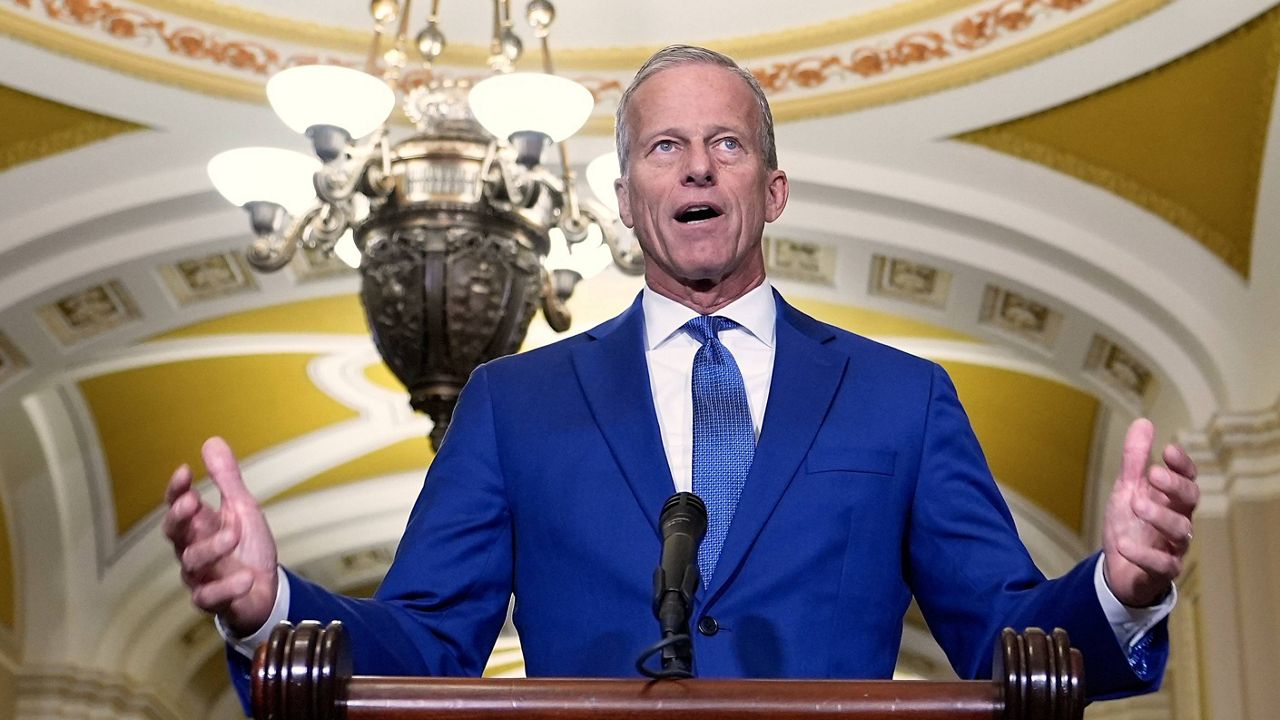WASHINGTON — President Donald Trump offered a muted assessment when asked about the role of the Senate parliamentarian in Congressional Republicans’ efforts to pass his tax and spending bill, stopping far short of others in the party who have expressed outrage after she dealt them a setback in advancing the legislation.
“The parliamentarian has been a little difficult, and I would say that I disagree with the parliamentarian on some things, and on other ways, she’s been fine,” Trump told reporters while taking questions in the briefing room before going on to stress the need for the bill to get across the finish line.
He stopped short, however, of outright saying that Senate Republicans should respect her decisions.
The response was markedly more tame than those from a handful of others in the GOP in the wake of the parliamentarian’s guidance that a key part of plan to save money on Medicaid in the bill did not fit the rules of the process they are using to pass it.
In perhaps the loudest response, Republican Sen. Tommy Tuberville of Alabama took to X to blast the parliamentarian, referring to her as “woke” and calling for her ousting.
“Unelected bureaucrats think they know better than U.S. Congressmen who are elected BY THE PEOPLE,” Tuberville wrote. “Her job is not to push a woke agenda. THE SENATE PARLIAMENTARIAN SHOULD BE FIRED ASAP.”
Republican Rep. Dan Crenshaw of Texas followed suit in also calling for her firing on X.
Rep. Greg Steube, R-Fla., meanwhile, criticized the amount of power that the unelected position holds and urged “elected leaders to take back control.”
“@JDVance should overrule the Parliamentarian and let the will of the people, not some staffer hiding behind Senate procedure, determine the future of this country,” he wrote on X, referencing Vice President JD Vance's role as president of the Senate.
And Rep. Marjorie Taylor Greene, R-Ga., slammed Senate Republican leader John Thune of South Dakota for ignoring her advice.
The role of the Senate parliamentarian is to provide guidance on rules and procedures in the upper chamber. The position is now held by Elizabeth MacDonough, who became the first woman in the role when she was tapped for it in 2012 by former Democratic Sen. Harry Reid of Nevada.The House has its own as well.
Currently, MacDonough is tasked with advising Senate Republicans on whether the measures in Trump’s agenda legislation, which he dubbed the “one big, beautiful bill,” adhere to the rules that govern the process they are seeking to use to pass it. The process, called budget reconciliation, allows Senators to clear a bill with a majority instead of needing to reach the 60 votes required for most legislation in the upper chamber.
Thus, Republicans could pass Trump’s bill without needing any Democratic support. But the process has guidelines on not allowing measures unrelated to spending, taxes and the debt limit, which is where the parliamentarian comes in.
And on Thursday, MacDonough handed Senate Republicans a blow when she advised them that a part of their Medicaid changes did not adhere to the procedural rules, sending them back to find ways to cut costs elsewhere. A handful of Republicans had already been expressing concerns over some of the Medicaid proposals, particualrly warning about their potential impact on rural hospitals.
Republicans are scrambling to get the bill, which contains tax cuts, a boost in border and defense spending, changes to Medicaid to save money and more, across the finish line in the Senate before it can go back to the House and ultimately Trump’s desk for his signature. The president has made clear he wants the bill by July 4, although he gave some wiggle room on the deadline on Friday.
“It’s important, it’s not the end all,” Trump said.
The Senate parliamentarian’s advice is considered a recommendation but if ignored could open up chances for any senator to raise objections, leading to votes over the disputes.
Thune has said multiple times that he does not plan to overrule the parliamentarian’s advice, including after the Medicaid decision, when he told reporters it would not be a “good option” for getting a bill done.
MacDonough has also handed setbacks to Democrats in the past, such as when congressional Democrats were seeking to use the reconciliation process for their own bill during former President Joe Biden’s time in the White House.
The majority leader in the Senate can pick and or remove the chamber’s parliamentarian.










